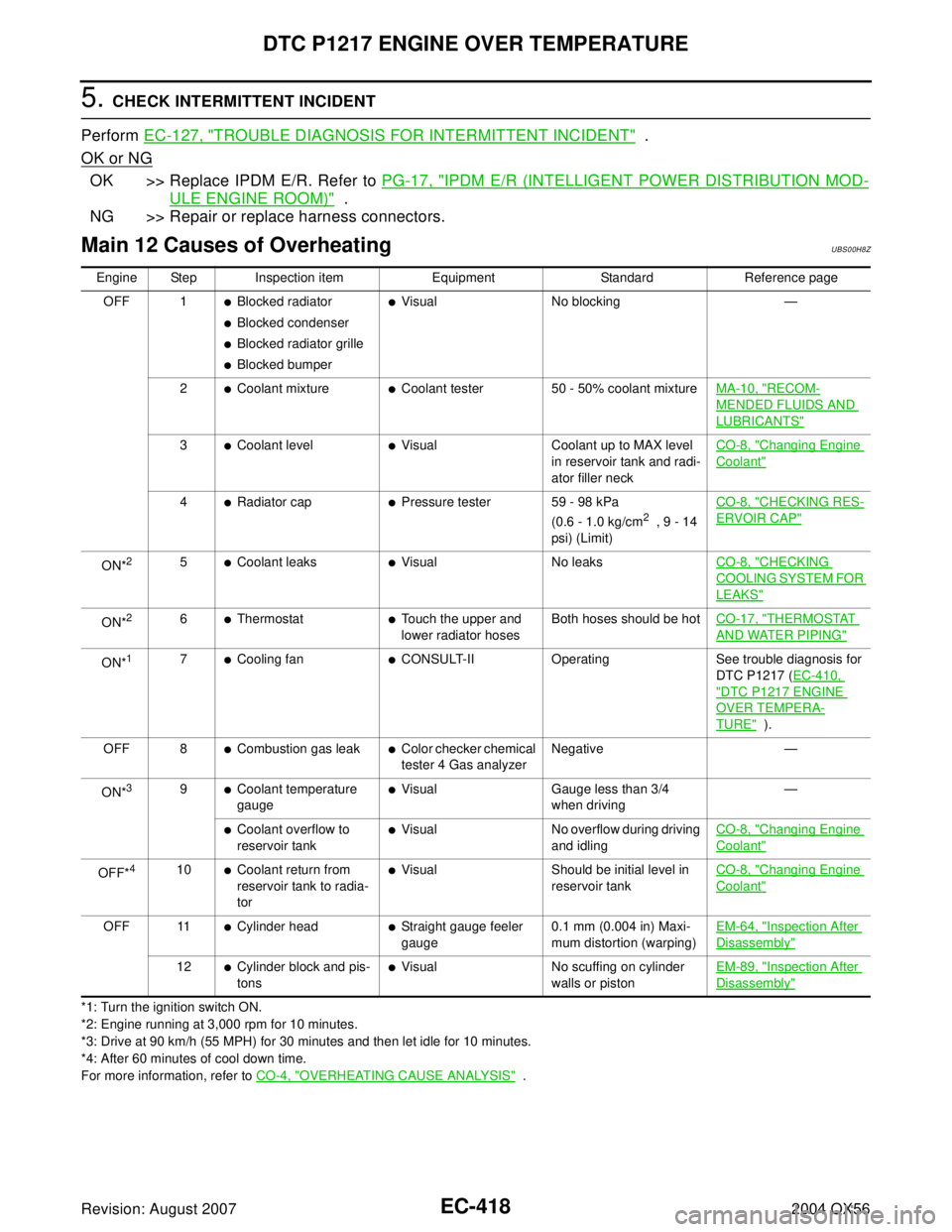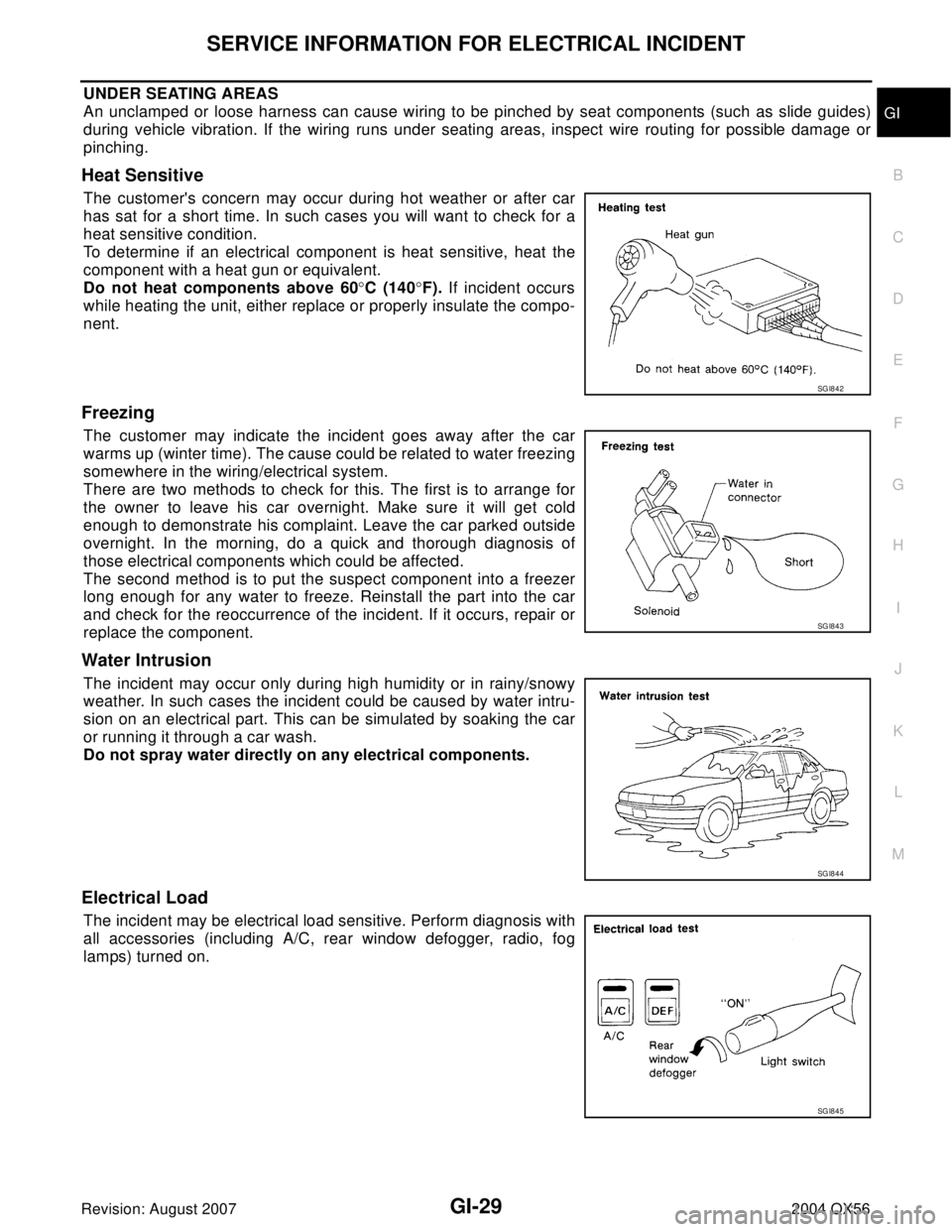Page 1609 of 3371

EC-418Revision: August 2007
DTC P1217 ENGINE OVER TEMPERATURE
2004 QX56
5. CHECK INTERMITTENT INCIDENT
Perform EC-127, "
TROUBLE DIAGNOSIS FOR INTERMITTENT INCIDENT" .
OK or NG
OK >> Replace IPDM E/R. Refer to PG-17, "IPDM E/R (INTELLIGENT POWER DISTRIBUTION MOD-
ULE ENGINE ROOM)" .
NG >> Repair or replace harness connectors.
Main 12 Causes of OverheatingUBS00H8Z
*1: Turn the ignition switch ON.
*2: Engine running at 3,000 rpm for 10 minutes.
*3: Drive at 90 km/h (55 MPH) for 30 minutes and then let idle for 10 minutes.
*4: After 60 minutes of cool down time.
For more information, refer to CO-4, "
OVERHEATING CAUSE ANALYSIS" . Engine Step Inspection item Equipment Standard Reference page
OFF 1
�Blocked radiator
�Blocked condenser
�Blocked radiator grille
�Blocked bumper
�Visual No blocking —
2
�Coolant mixture�Coolant tester 50 - 50% coolant mixtureMA-10, "RECOM-
MENDED FLUIDS AND
LUBRICANTS"
3�Coolant level�Visual Coolant up to MAX level
in reservoir tank and radi-
ator filler neckCO-8, "Changing Engine
Coolant"
4�Radiator cap�Pressure tester 59 - 98 kPa
(0.6 - 1.0 kg/cm2 , 9 - 14
psi) (Limit)CO-8, "
CHECKING RES-
ERVOIR CAP"
ON*25�Coolant leaks�Visual No leaksCO-8, "CHECKING
COOLING SYSTEM FOR
LEAKS"
ON*26�Thermostat�Touch the upper and
lower radiator hosesBoth hoses should be hotCO-17, "THERMOSTAT
AND WATER PIPING"
ON*17�Cooling fan�CONSULT-II Operating See trouble diagnosis for
DTC P1217 (EC-410,
"DTC P1217 ENGINE
OVER TEMPERA-
TURE" ).
OFF 8
�Combustion gas leak�Color checker chemical
tester 4 Gas analyzerNegative —
ON*
39�Coolant temperature
gauge�Visual Gauge less than 3/4
when driving—
�Coolant overflow to
reservoir tank�Visual No overflow during driving
and idlingCO-8, "Changing Engine
Coolant"
OFF*410�Coolant return from
reservoir tank to radia-
tor�Visual Should be initial level in
reservoir tankCO-8, "Changing Engine
Coolant"
OFF 11�Cylinder head�Straight gauge feeler
gauge0.1 mm (0.004 in) Maxi-
mum distortion (warping)EM-64, "Inspection After
Disassembly"
12�Cylinder block and pis-
tons�Visual No scuffing on cylinder
walls or pistonEM-89, "Inspection After
Disassembly"
Page 2110 of 3371

SERVICE INFORMATION FOR ELECTRICAL INCIDENT
GI-29
C
D
E
F
G
H
I
J
K
L
MB
GI
Revision: August 20072004 QX56
UNDER SEATING AREAS
An unclamped or loose harness can cause wiring to be pinched by seat components (such as slide guides)
during vehicle vibration. If the wiring runs under seating areas, inspect wire routing for possible damage or
pinching.
Heat Sensitive
The customer's concern may occur during hot weather or after car
has sat for a short time. In such cases you will want to check for a
heat sensitive condition.
To determine if an electrical component is heat sensitive, heat the
component with a heat gun or equivalent.
Do not heat components above 60°C (140°F). If incident occurs
while heating the unit, either replace or properly insulate the compo-
nent.
Freezing
The customer may indicate the incident goes away after the car
warms up (winter time). The cause could be related to water freezing
somewhere in the wiring/electrical system.
There are two methods to check for this. The first is to arrange for
the owner to leave his car overnight. Make sure it will get cold
enough to demonstrate his complaint. Leave the car parked outside
overnight. In the morning, do a quick and thorough diagnosis of
those electrical components which could be affected.
The second method is to put the suspect component into a freezer
long enough for any water to freeze. Reinstall the part into the car
and check for the reoccurrence of the incident. If it occurs, repair or
replace the component.
Water Intrusion
The incident may occur only during high humidity or in rainy/snowy
weather. In such cases the incident could be caused by water intru-
sion on an electrical part. This can be simulated by soaking the car
or running it through a car wash.
Do not spray water directly on any electrical components.
Electrical Load
The incident may be electrical load sensitive. Perform diagnosis with
all accessories (including A/C, rear window defogger, radio, fog
lamps) turned on.
SGI842
SGI843
SGI844
SGI845
Page 3038 of 3371
HEATED SEAT
SE-89
C
D
E
F
G
H
J
K
L
MA
B
SE
Revision: August 20072004 QX56
H E AT E D S E ATPFP:87335
Description EIS002ZF
�When handling seat, be extremely careful not to scratch heating unit.
�To replace heating unit, seat trim and pad should be separated for front seat cushion LH. For seatback
and front seat cushion RH, complete cushion or seatback assembly must be replaced.
�Do not use any organic solvent, such as thinner, benzene, alcohol, etc. to clean trim.
WIIA0031E
Page 3046 of 3371
FRONT SEAT
SE-97
C
D
E
F
G
H
J
K
L
MA
B
SE
Revision: August 20072004 QX56
1. Headrest 2. Headrest holder with multi-position
lock 3. Seatback assembly
4. Lumbar switch bezel 5. Power seat switch escutcheon 6. Recliner switch knob
7. Slide switch knob 8. Driver power seat frame assembly 9. LH outer leg cover
10. Driver seat wiring harness 11. Bolt cover 12. Seat cushion outer finisher
13. Outer pedestal finisher 14. Seat cushion front finisher 15. Seat cushion inner finisher
16. Seat cushion frame 17. Seat cushion heating element 18. Seat cushion pad
19. Seat cushion trim cover 20. Armrest assembly 21. Headrest holder
22. Seat slide/ recline switch 23. Lumbar switch
Page 3052 of 3371
REAR SEAT
SE-103
C
D
E
F
G
H
J
K
L
MA
B
SE
Revision: August 20072004 QX56
REAR SEATPFP:88300
Removal and InstallationEIS002ZK
SECOND ROW OUTBOARD
Removal
1. Remove seat base trim cover.
2. Lift handle and tilt seat forward.
3. DIsconnect the seat cushion heating element electrical connec-
tor.
4. Remove seat anchor nuts, bolts and seat assembly.
Installation
Installation is in the reverse order of removal.
SECOND ROW CENTER
Removal
1. Tilt the seat cushion forward.
2. Remove the seat anchor bolts.
3. Tilt the seat cushion back and remove the seat.
Installation
Installation is in the reverse order of removal.
THIRD ROW
Removal
1. Remove the lower base trim covers.
2. Remove front anchor bolts.
3. Retract the seat into the cargo floor position.
LIIA1119E
LIIA1116E
LIIA1029E
Page 3055 of 3371

SE-106
REAR SEAT
Revision: August 20072004 QX56
1. Headrest 2. Seatback pad 3. Seatback frame
4. Rear seat bezel 5. RH Headrest guide 6. LH Headrest guide
7. Seat back panel 8. Seat actuator assembly 9. Reclining device inner cover
10. Reclining device inner mid cover 11. Armrest assembly 12. Latch assembly
13. Seat cushion mat springs 14. Seat cushion mat 15. Seat cushion frame assembly
16. Seat support trim cover 17. Seat support pad assembly 18. Lower rear seat cover
19. Lower rear seat cover inner 20. Outboard cushion floor latch 21. Seat cushion support frame assem-
bly
22. Inboard cushion floor latch 23. Seat cushion support frame assem-
bly24. Lower rear seat cover outer
25. Seat cushion pad 26. Inner inboard reclining device cover 27. Outer inboard reclining device cover
28. Seat latch and recliner release 29. Reclining device outer mid cover 30. Reclining device lever
31. Reclining device outer cover 32. Seatback trim cover 33. Seat cushion trim cover
34. Seat cushion heating element
Page 3059 of 3371
SE-110
REAR SEAT
Revision: August 20072004 QX56
7. Headrest 8. Seat latch and recliner release 9. Reclining device outer cover
10. Reclining device lever 11. Reclining device outer mid cover 12. Outer inboard reclining device cover
13. Inner inboard reclining device cover 14. Seat cushion trim cover 15. Seat cushion pad
16. Seat cushion frame assembly 17. Lower rear seat cover outer 18. Outboard cushion floor latch
19. Seat cushion support frame assem-
bly 20. Inboard cushion floor latch 21. Lower rear seat cover inner
22. Lower rear seat cover 23. Seat support pad assembly 24. Seat support trim cover
25. Seat cushion mat 26. Seat cushion mat springs 27. Latch assembly
28. Armrest assembly 29. Armrest trim cover 30. Reclining device outer cover
31. Reclining device inner cover 32. Seatback frame 33. Seat actuator assembly
34. Seat cushion heating element
Page:
< prev 1-8 9-16 17-24